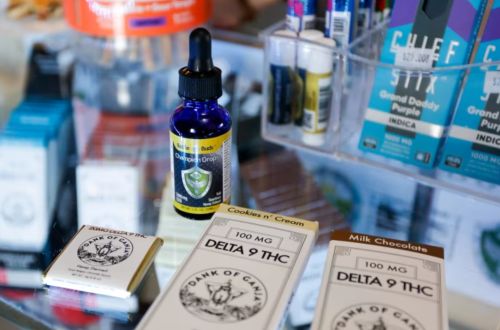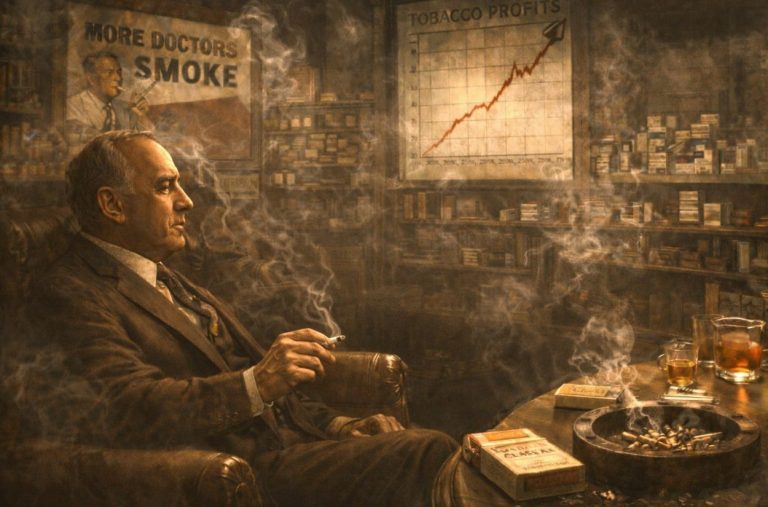

The shutdown bill’s hidden hemp provision has triggered a reckoning not just for farmers and manufacturers, but for the integrity of federal policymaking itself.

By Matthew A. McIntosh
Public Historian
Brewminate
Introduction
A quietly inserted clause in the bill to keep the federal government funded has triggered outrage across the hemp industry, where farmers and small manufacturers say they were blindsided by language that bans any hemp-derived product containing more than 0.4 milligrams of total THC per container. The measure was added to the must-pass legislation with little public debate, immediately raising alarms among growers, processors and retailers whose businesses rely on the legal framework established by the 2018 Farm Bill.
The provision strikes at the center of a rapidly expanding market built around hemp-derived cannabinoids, a space that has grown in the regulatory gray zone between federal hemp legalization and state-level cannabis laws. Industry groups warn that up to 95 percent of existing hemp products could be eliminated under the new federal limit.
What most of the public did not see coming was who backed the change. Reports detail an aggressive lobbying push from major alcohol industry groups seeking to restrict or eliminate hemp-derived THC beverages, which they view as a rising competitor in the intoxicant market.
For hemp farmers, particularly in states like Texas where previous attempts to enact a similar ban failed at the state level, the federal provision lands like a direct economic strike. Many growers now fear the loss of their entire business model under a rule they had no opportunity to contest.
The result is a national industry on edge, a powerful lobbying bloc celebrating a win and a controversial provision reshaping an entire market before most Americans even knew it existed.
Background: How the Hemp Sector Became a Regulatory Flashpoint
The roots of the current crisis stretch back to the 2018 Farm Bill, which legalized hemp nationwide by defining it as cannabis containing no more than 0.3 percent delta-9 THC by dry weight. That law opened the door to an unexpected market boom. By exploiting the chemical flexibility of the hemp plant, manufacturers began producing intoxicating compounds such as delta-8 and delta-10 THC from legally grown hemp. These products, often sold in beverages, gummies and vapes, surged in popularity under the premise that they remained federally legal despite producing psychoactive effects.
As legal analysts note, this gap emerged because the 2018 law focused narrowly on delta-9 THC content rather than total THC or the effects of chemically converted cannabinoids. That omission allowed companies to create products that could mimic the potency of state-regulated cannabis while avoiding the tighter rules, taxes and licensing requirements placed on the marijuana industry. This loophole gave rise to an entire category of hemp-derived intoxicants that neither Congress nor federal regulators anticipated.
The market grew quickly and unevenly. Some states imposed their own restrictions, while others allowed hemp-derived THC products to flourish with minimal oversight. This patchwork environment created tension between traditional cannabis regulators, hemp producers and competing industries that saw the products as both disruptive and underregulated.
By 2024 and 2025, the boom had caught the attention of federal lawmakers, especially as reports emerged of inconsistent testing standards, mislabeled potency levels and a surge of intoxicating hemp drinks competing with alcohol in bars and retail markets. The lack of a uniform regulatory framework set the stage for competing lobbying efforts.
Congress spent months debating broader reforms to the hemp sector, but consensus never emerged. Instead, the funding bill became the unexpected vehicle for the most sweeping federal restriction the industry has ever faced, setting off the economic and political fallout now reverberating across the country.
The Provision and Its Impact
The new federal restriction is brief but sweeping. The government funding bill includes language banning the sale of any hemp-derived product containing more than 0.4 milligrams of total THC per container, regardless of its form or cannabinoid type. The limit applies to beverages, edibles, tinctures and inhaled products, placing nearly the entire market outside the bounds of federal legality.
The measure does not take immediate effect. Lawmakers inserted a one-year grace period before enforcement begins, giving manufacturers time to reformulate or wind down operations. Even so, industry analysts say few companies can feasibly produce psychoactive hemp products that stay under 0.4 milligrams of total THC, making the practical outcome a near-total market collapse.
Coverage underscores the scale of the disruption. Trade groups estimate that up to 95 percent of hemp-derived THC products will be forced off shelves nationwide under the new limit, affecting thousands of small retailers, processors and distributors. Many of these businesses built their operations around the 2018 Farm Bill’s definition of legal hemp and now face a regulatory reversal without dedicated debate or hearings.
The fallout is already visible in states with major hemp markets. Texas farmers and manufacturers are bracing for severe losses, noting the irony that the state legislature rejected an almost identical statewide ban earlier this year. The new federal rule overrides that outcome, forcing the industry into a sudden and precarious position.
National distributors warn that even non-intoxicating hemp products may be swept into the chaos. The uncertainty around total THC measurement, product testing variability and enforcement discretion could create confusion for retailers already operating on thin margins in a volatile market.
In a single legislative move, Congress has reframed the legal status of an entire sector. Businesses now face an unprecedented federal limit, a compressed timeline and an evolving regulatory environment that threatens the survival of the hemp-derived THC industry.
Who Pushed This and Why
The hemp language did not appear in a vacuum. The provision in the shutdown-ending funding bill is a priority of Senate Republican leader Mitch McConnell and Representative Andy Harris, who have pushed for a federal crackdown on intoxicating hemp products even as some of their colleagues defend the industry. Sludge notes that the hemp ban was added by Republican leadership after a lobbying campaign from trade groups representing large alcohol companies and beer makers, with Senator Rand Paul warning that the measure “has nothing to do with reopening the government” and would harm Kentucky farmers he has long championed.
Behind that push stands a powerful segment of the alcohol lobby. Some of the biggest alcohol trade organizations in the country, including the Beer Institute, the Distilled Spirits Council of the United States, Wine America and the Wine Institute, sent a letter to congressional leaders urging them to “immediately remove hemp-derived THC products from the marketplace until a robust federal regulatory framework is established”. These groups represent many of the best-known beer, wine and spirits brands in the United States, and OpenSecrets data notes that alcohol companies spent nearly 30 million dollars on federal lobbying in the last election cycle.
The industry is not unified. Reports describe what a “civil war” within alcohol, pointing out that while producer-focused lobbies want hemp drinks pulled from the market until federal rules exist, a coalition of 54 beer, wine and spirits distributors from twenty-six states has publicly urged Congress to keep hemp beverages legal and instead regulate and tax them like alcohol. In their letter, distributors warn that if prohibition is enacted, demand for hemp beverages “will not disappear” but will move into unregulated channels, an argument that echoes historical lessons from alcohol prohibition.
The shutdown bill became the vehicle for resolving that internal fight in one direction. As lawmakers searched for a way out of the government funding standoff, Republicans attached the hemp provision to the broader compromise, effectively giving the producer lobbies what they had asked for by sharply restricting hemp-derived THC products nationwide. In practical terms, the result is a federal policy that significantly protects alcohol’s market position against a new class of intoxicating competitors, while farmers and small hemp businesses are left to absorb the cost of a decision made far from their fields and processing plants.
Stakes for Hemp Farmers and Small Business
For the people who grow and process hemp, the federal limit is not an abstract regulatory update. It is a direct threat to their livelihoods. Thousands of farmers and manufacturers built their businesses around the legal landscape created by the 2018 Farm Bill, which unlocked new markets after decades of prohibition. Many invested heavily in extraction equipment, product development and supply chains tailored to hemp-derived cannabinoids, assuming the federal definition of hemp was stable. Industry leaders now warn that the new 0.4 milligram cap effectively eliminates the category they rely on, leaving few viable paths forward.
The economic ripple effects extend far beyond the farms themselves. There are concerns from Texas growers who already fought off a similar ban at the state level earlier this year. Their victory is now nullified by the federal language, and many say they will be forced to shutter operations because the state’s hemp sector depends heavily on infused products that cannot meet the new limit. One grower said the bill “hands our entire market to other industries,” echoing fears that alcohol and cannabis companies will benefit from hemp product elimination rather than meaningful regulation.
Uncertainty is compounding the financial distress. Small retailers fear they will be the first to suffer, since most lack the capital to reformulate products or navigate unclear enforcement standards. Variations in testing, discrepancies in measuring total THC and inconsistent state guidance have already made compliance difficult. The new federal rule amplifies this problem by establishing a threshold nearly impossible for common products to meet, creating confusion and risk for businesses that cannot afford legal missteps.
While regulators argue the change improves public safety, industry advocates contend that prohibition will simply push demand into unregulated channels. Distributors warn that consumers will not abandon hemp-derived beverages, but will turn to untested and potentially unsafe alternatives if legal options vanish. Their position mirrors decades of evidence from alcohol and drug policy: bans often fuel unregulated markets rather than eliminating consumer interest.
Across the country, the immediate question for farmers and small producers is not how to compete, but how to survive. The markets they created and relied upon have been undercut by a federal decision made with little transparency, leaving them to absorb the economic shock with few resources and limited political leverage.
Bigger Picture: Regulation, Fairness and Industry Capture
The fight over hemp-derived THC has exposed a deeper question about how federal policy is shaped, who benefits from last-minute legislative maneuvering and which industries have the influence to rewrite markets overnight. The shutdown bill’s surprise provision arrives at the intersection of regulatory ambiguity, market disruption and concentrated lobbying power. Lawmakers struggled for months to find consensus on hemp reform through normal legislative channels, only to see the most consequential change slip into a must-pass bill with almost no debate.
This method of policymaking has raised alarms among industry groups and legal analysts who argue that the rule does not establish a clear regulatory framework. Instead, it wipes out nearly all intoxicating hemp products while leaving fundamental questions about testing standards, enforcement, public safety and product classification unresolved. Federal agencies have struggled for years to create a consistent system for overseeing hemp-derived cannabinoids, producing a vacuum that states, manufacturers and competing industries have filled with their own interpretations and interests.
The alcohol lobby’s role has added another layer to the debate. Coverage highlights how large alcohol producers pursued a strategy of framing hemp-derived beverages as unsafe and unregulated competitors rather than advocating for standardized oversight. Public letters, lobbying expenditures and targeted messaging helped shape the narrative that Congress ultimately acted upon. By contrast, distributors within the same industry argued that prohibition would backfire by pushing consumers toward unregulated channels and harming small retailers. This divide underscores how the shutdown bill’s provision reflects the interests of one side of the alcohol sector more than a unified position or a public health consensus.
At the policy level, critics warn that the federal cap could shift economic power rather than addressing public safety. The Texas Tribune reports that state-level hemp industries had requested clear rules, consistent testing and better labeling requirements, not a product-eliminating ban. Their concern is that Congress has chosen an approach that protects incumbent industries, including alcohol and state-regulated cannabis, while displacing farmers and small processors who lack political influence.
The broader implications extend beyond hemp. When a market can be reshaped with a sentence added to a must-pass bill, questions arise about fairness, transparency and the vulnerability of small industries to better-funded competitors. The outcome of this provision will serve as a test of how Congress balances economic interests, public safety and the political leverage of industries competing for the same consumer base.
What Happens Next?
The shutdown bill’s hemp provision does not take effect immediately, but the runway is short. The measure includes a one-year phase-in, after which any product exceeding 0.4 milligrams of total THC per container becomes illegal to sell nationwide. That timeline forces manufacturers to choose between attempting costly reformulations that may not be technically feasible or winding down operations entirely. Many companies have already told reporters that no currently popular product category can remain legal under the new threshold, making reformulation an uphill battle.
State governments are also bracing for impact. Texas lawmakers, who previously debated statewide restrictions but ultimately rejected a ban, now face a federal mandate overriding their decision. Other states with thriving hemp markets, including Tennessee, Kentucky and North Carolina, are beginning to examine whether existing laws need to be rewritten to avoid conflicts with federal enforcement. Some states may attempt to carve out limited exceptions or implement short-term regulatory protections, but their authority is constrained by the federal definition of legal hemp products.
Industry groups are preparing to challenge the rule through lobbying and possible litigation. While no lawsuits have yet been announced, reporting notes that associations representing hemp processors and retailers are evaluating whether the provision could be challenged on the grounds that it exceeds congressional intent in the 2018 Farm Bill or violates the Administrative Procedure Act if implemented through agency rulemaking. Legal experts quoted in these reports caution that litigation faces an uphill climb due to Congress’s broad authority to legislate in this area, but note that economic harm to farmers could play a role in whatever legal arguments emerge.
Meanwhile, the market itself is likely to fragment. Some manufacturers are expected to pivot toward non-intoxicating cannabinoids, while others may shift operations to the regulated cannabis market in states where recreational marijuana is legal. Reporting highlights concerns that consumers who have come to rely on hemp beverages and edibles will either turn to illicit channels or migrate toward cannabis dispensaries, weakening both price stability and regulatory control.
The next year will determine whether the hemp industry can reorganize around new legal constraints or whether the federal government has effectively ended a sector that grew faster than lawmakers or regulators anticipated. With farmers, retailers and manufacturers facing the most uncertainty they have experienced since 2018, the path forward remains deeply unsettled.
Conclusion
The shutdown bill’s hidden hemp provision has triggered a reckoning not just for farmers and manufacturers, but for the integrity of federal policymaking itself. The 0.4-milligram cap rewrites the rules of an entire industry in a single legislative stroke, eliminating nearly all hemp-derived THC products even as lawmakers acknowledge that Congress has struggled to establish a coherent regulatory framework. Coverage makes clear that the people most affected by this decision are those who invested in a market Congress created in 2018 and then reshaped without public debate.
What emerges in the reporting is a portrait of policy driven less by transparent regulation than by the influence of competing industries. Large alcohol producers lobbied for a prohibitionist approach, distributors urged Congress to maintain legality and introduce standards and lawmakers chose the path of maximum restriction. The result reflects a political system where economic power often shapes outcomes more decisively than public input or long-term planning.
For hemp farmers, the economic damage could be severe. For consumers, the sudden disappearance of a popular category of products may push demand into unregulated spaces, raising questions about safety and oversight. For policymakers, the episode underscores the risks of using must-pass legislation to resolve complex regulatory disputes.
The next year will test whether the hemp sector can adapt, whether Congress revisits the issue with a more comprehensive approach and whether federal regulators can build rules that balance safety, transparency and fairness. At stake is not only the future of hemp-derived cannabinoids but the broader question of how federal policy treats emerging industries that lack the lobbying muscle of their competitors.
Originally published by Brewminate, 11.14.2025, under the terms of a Creative Commons Attribution-NonCommercial-NoDerivatives 4.0 International license.


